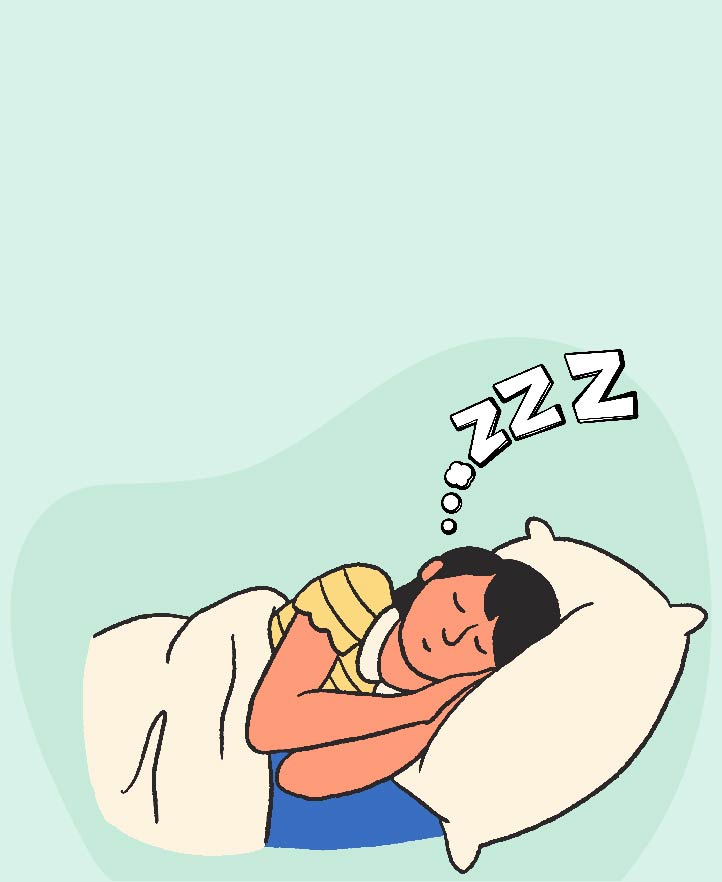

Oversleeping: How Much Sleep Is Too Much?
Getting enough sleep is essential for health, but can too much sleep be harmful? While most adults need 7-9 hours of nightly sleep, regularly sleeping beyond that might signal underlying issues or affect your well-being. Oversleeping, medically known as hypersomnia, has been linked to problems like fatigue, mood changes, and increased risk of certain health conditions. Understanding how much sleep is ideal for you and recognising when it becomes excessive can help you maintain a balanced, healthy lifestyle. Read on to know more.
Why Do People Sleep Too Much?
If you’re wondering “Why am I sleeping too much?” then understand that several factors, ranging from medical conditions to lifestyle habits, can cause you to sleep more than the recommended amount. Here are some common reasons for excessive sleeping:
1. Medical Conditions:
Disorders like sleep apnea, hypothyroidism, and neurological diseases can cause excessive sleep.
2. Mental Health Issues:
Depression and anxiety are often linked to prolonged sleep duration.
3. Hypersomnia:
A medical condition characterised by excessive daytime sleepiness and prolonged night sleep.
4. Poor Sleep Quality:
Disrupted or non-restorative sleep may cause people to sleep longer to compensate.
5. Medications:
Some drugs have side effects that increase sleepiness or the need for more sleep.
6. Lifestyle Factors:
Sedentary lifestyle and irregular sleep schedules can contribute to oversleeping.
7. Chronic Illnesses:
Conditions such as diabetes and heart disease may affect sleep patterns.
Medical Problems Linked to Oversleeping
Here are some common oversleeping side effects:
1. Sleep Apnea:
This condition causes your breathing to stop and start during sleep, breaking up your rest. Because of this, you might feel very sleepy during the day and end up sleeping longer to catch up on missed rest.
2. Depression:
People with depression often sleep too much or too little. Oversleeping can be a way the body reacts to feeling tired and low, but too much sleep might actually make you feel worse.
3. Hypothyroidism:
When your thyroid is underactive, your body slows down. This can make you feel tired and need more sleep than usual, even if you still don’t feel fully rested.
4. Diabetes:
Uncontrolled diabetes can make you feel tired. High or low blood sugar levels affect your energy, causing you to sleep longer than normal.
5. Chronic Fatigue Syndrome:
This illness causes extreme tiredness that doesn’t get better with sleep. People with this condition might spend more time sleeping but still feel exhausted.
6. Heart Disease:
Some studies link longer sleep durations with higher risks of cardiovascular problems.
7. Neurological Disorders:
Diseases like Parkinson’s and epilepsy affect the brain’s control over sleep. This can make people sleep more or feel very sleepy during the day.
Get the Benefits of Sleep Without Oversleeping
To enjoy the full benefits of sleep while avoiding oversleeping, consider adopting these healthy habits:
1. Stick to a Consistent Sleep Schedule:
Going to bed and waking up at the same time daily can help regulate the body’s internal clock. This helps improve sleep quality.
2. Aim for 7-9 Hours:
Most adults need 7-9 hours of sleep per night to feel rested and alert without the risks of oversleeping.
3. Avoid Caffeine close to Bedtime:
Caffeine is a stimulant that can interfere with your ability to fall asleep and reduce sleep quality. It’s best to avoid coffee, tea, energy drinks, and other caffeinated products at least 4-6 hours before going to bed to ensure a restful night.
4. Create a Relaxing Bedtime Routine:
Activities like reading, gentle stretching, or meditation before bed can help you fall asleep faster.
5. Limit Naps and Screen Time Before Bed:
Avoid long naps and reduce exposure to blue light from screens in the evening. They can interfere with nighttime sleep.
6. Exercise Regularly:
Moderate physical activity promotes better sleep but avoid intense workouts close to bedtime.
7. Manage Stress:
Practices like mindfulness, deep breathing, and journalling can reduce stress and prevent sleep disturbances.
How Much Sleep Do You Really Need?
Sleep needs vary throughout life, with different age groups requiring different amounts of rest to support growth, health, and daily functioning. The recommended sleep duration by age is as follows:
• Newborns (0-3 months):
14-17 hours per day
• Infants (4-11 months):
12-15 hours per day
• Toddlers (1-2 years):
11-14 hours per day
• School-age children (6-13 years):
9-11 hours per night
• Teenagers (14-17 years):
8-10 hours per night
• Young adults (18-25 years):
7-9 hours per night
• Adults (26-64 years):
7-9 hours per night
• Older adults (65+ years):
7-8 hours per night
Conclusion
Understanding the right amount of sleep for your age and lifestyle is essential to maintaining good health and preventing the risks linked to both insufficient and excessive sleep. Prioritising quality rest supports your physical and mental well-being, helping you stay energised and focused throughout the day. Alongside adopting healthy sleep habits, it’s important to be prepared for any health challenges that may arise. Choosing to buy health insurance ensures you have access to medical care, including consultations, treatments for sleep disorders, and management of related chronic conditions like diabetes or heart disease. Health insurance can cover doctor visits, diagnostic tests, and medications, making it a valuable investment in your overall wellness.
One of the important components of our overall wellness is also being financially secured. Healthcare emergencies can happen any time, but a good health insurance policy can protect you from such uncertain situations. To know more about Wellness and other health related tips, visit the wellness corner.
Disclaimer: This blog provides general information and discussions about health and related subjects. The information and other content provided in this blog, website or any linked materials are not intended and should not be considered or used as a substitute for medical advice, diagnosis or treatment. Kindly contact your doctor before starting a new medicine or health regime.
Related Articles
Sleep Deprivation: What It Is, Symptoms, Treatment & Stages
How Yoga Can Help You Sleep Better?
How Yoga Can Help You Sleep Better?
How to Handle Sleep Regression in Newborns and Infants
Published on July 8, 2025















 Health Insurance
Health Insurance  Travel Insurance
Travel Insurance  Car Insurance
Car Insurance  Cyber Insurance
Cyber Insurance  Critical Illness Insurance
Critical Illness Insurance
 Pet Insurance
Pet Insurance
 Bike/Two Wheeler Insurance
Bike/Two Wheeler Insurance  Home Insurance
Home Insurance  Third Party Vehicle Ins.
Third Party Vehicle Ins.  Tractor Insurance
Tractor Insurance  Goods Carrying Vehicle Ins.
Goods Carrying Vehicle Ins.  Passenger Carrying Vehicle Ins.
Passenger Carrying Vehicle Ins.  Compulsory Personal Accident Insurance
Compulsory Personal Accident Insurance  Travel Insurance
Travel Insurance  Rural
Rural